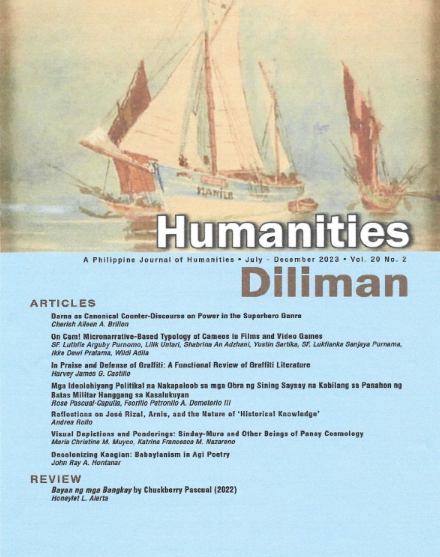The framework of being (agi) and becoming (kaagian) from Western Visayan poetry enriches our understanding of “queerness” without western/Eurocentric theorizing
30 Apr 2024

This paper analyzes poetry written by self-identified Agi (Panayanon indigenous gay identity) using the concept of power called gahum as its critical framework. Gay criticism in the Philippines has been too focused on the discourse of kabaklaan in Manila and not much has been said about indigenous models of queerness in the regions. The paper traces the connection of the agi and the babaylan (precolonial Shaman), as contemporary agi writers in the West Visayan region continue to champion the image of the babaylan in their writings. The babaylan is a shaman, culture bearer and political leader that embodies physical and spiritual powers that go beyond the human realm. By exploring the concepts of kaagian, gahum and babaylanism, this study reveals that agi writers use the image of the babaylan to subvert sources of oppression like colonialism and patriarchy and to empower the agi identity.
This study is a welcome addition to a growing body of literature that seeks to articulate local experiences of gender and sexuality in the Philippines as rendered in poetic forms. Focusing on agi poetry, the study reveals the peculiarities of agi culture and the writing it produces, considering the Panayanon world view that informs both. Highlighted in the research is how the Panayanon’s animist worldview which includes the element of gahum, has continued to influence contemporary Panayanon culture. Also, such worldview as revealed in the poems analyzed, has shaped to a certain extent the agi persona’s selfhood and community life characterized by animism and supernatural elements.
Aside from historicizing the tradition of agi writing in the region, the study formulates a local framework to understand the peculiarities attuned with the Panayanon space. With the cultural grounding of the analytical framework used in reading the poems, the discussion presents a different articulation of queerness or kaagian in Western Visayas.
The study veers away from western theorizing to unpack an indigenous articulation of queerness. It interrogates modes of being (agi) and becoming (kaagian) from the poetic archive of Western Visayas to enrich our understanding of what can be termed “queerness” without its Western/Eurocentric baggage. This is crucial because the study posits the “agi” as a nativist, anti-colonial articulation of queer sexuality rooted in and enriched by its indigenous milieu.
Author: John Ray A. Hontanar (University of the Philippines Visayas)
Read the full paper: https://journals.upd.edu.ph/index.php/humanitiesdiliman/article/view/9461/8361
